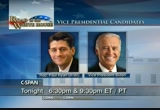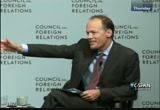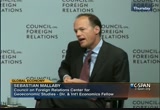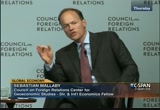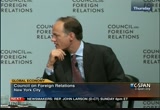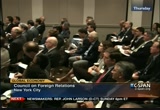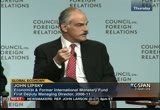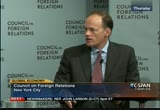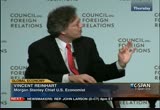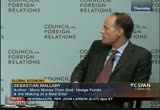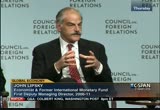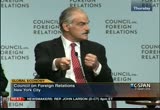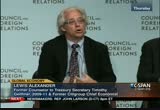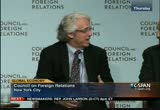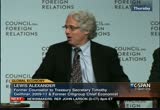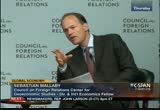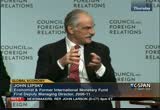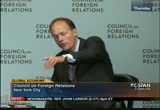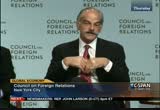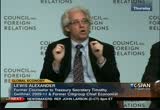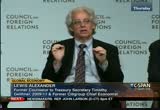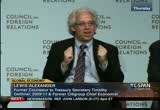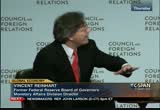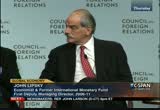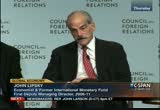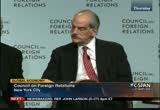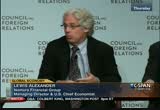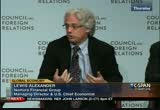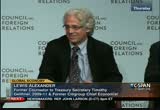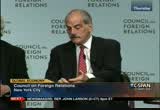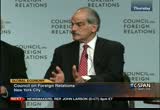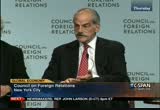tv U.S. European Debt CSPAN September 9, 2012 5:00pm-6:00pm EDT
5:00 pm
eastern and aaron at 9:30 eastern, here on c-span. now, a discussion about the impact of the european debt crisis on the economy as the approaching spending cuts and tax increases that to take a -- that to take place in january, 2015, known as the fiscal cliff. this is about one hour. >> good morning. i think we can get started. for those of you don't know me, i worked here at the council. couple of housekeeping things -- please remember this is on the record, this meeting. you are supposed to turn off your blackberry and iphone that that go beep and mess up the system. if you have a samsung device, the apple lawyers will be waiting for you on the mezzanine. [laughter] we have a great group for this world economic meeting. we have the old timers and the old, old timer.
5:01 pm
then said reinhardt, over there on the -- vincent reinhardt, over there -- [inaudible] and the kind of anchorperson of this meeting a series when it was going awhile ago and he is now at price and was recently at the national -- in the national monetary fund. we obviously have a good appreciation from the size of the audience of the quality of this panel and we may have a grasp of the precariousness of the economy. this could be a leading indicator. it runs obviously from the meeting in europe going on right of to next week's meeting the fed and the chinese lowdown. but we thought we would start with europe -- the chinese slowdown.
5:02 pm
it would be unfair to predict things if they're not going to be disproved in at least 47 minutes. but at this time, the press conference from draghi will be in an hour. vincent, if there is some kind of indication there will be bond purchases from the european central bank, the programs are countries that do program -- that do have programs, could you get out of that? is the contract as it was with the european central bank -- they jammed a trillion euros of liquidity into the bank in two operations and you could see the money in the bank. in this case, what they're
5:03 pm
saying is we will support on a conditional basis economic reform programs that will stop in mid stream at such time they don't comply with that economic conditions. how much confidence will investors get out of that? >> with regards to the repurchase operations, it's true they were delineated. but they were also in direct government support because they required financial institutions that use those to support government and it is true that banks in italy and spain bought more debt than their government issue. i hope you have all turn your blackberries off so that i'm now wrong by the time the sentence adams, the european central bank is showing a willingness to
5:04 pm
build a bridge. you emphasize the lack of specificity -- i think market participants will emphasize the open-ended nature of it. the grids will be as long as it takes for politicians to build the infrastructure required to make it more durable institution. they have a lot of heavy lifting to do. it there is no guarantee they will accomplish it. the open-ended part is what you should emphasize, not the lack of specificity. >> that would suggest that when draghi says i will do what ever it takes, people believe it. meanson't think he whatever it takes on condition for what ever. so many of these measures have proved to be disappointing. does this one have a different
5:05 pm
quality to it that what ever it takes means that whatever it takes? >> i do agree. what is inherent in what they're talking about is an evolution of the constraints. in the past, this support for sovereigns was beyond the pale and you see an evolution of how they see their core mandate that allows them to build the bridge and i think that is a very important change for the better. it is also important in terms of the constraints and the critics on the board and the degree to which they create a veto over any more active policy. if what we learned today is the european central bank is prepared to go ahead even though there is a prominent minority in opposition to this, it's a very important easing of constraints on how they can
5:06 pm
respond, which i think is very important. this can go wrong in all sorts of ways and it's no guarantee of the ultimate outcome, but it does mark an important change. >> let me get some general reaction from this -- one way it could go wrong is that supposing boehner agrees to come forward and ask for a program, but if the politics of for that to happen, they are eligible for the purchasing of sovereign bonds, but yet a situation where deposits are fleeing the spanish banking system, the banks are constrained in terms of how much they can extend credit. the price of credit is very high and that seems to suggest a very painful route out of the
5:07 pm
recession and can the program work if the public sector is supporting the program, but the banks are constrained, can you work your way out? >> there is a lot of heavy lifting that will be involved. it strikes me as a lot of attention being paid it to the european central bank and that is sensible since they are the folks who when the press comes, they can show up in the morning. i would focus more on the other things that the european central bank said let's act upon. those are very nontrivial. ons of timber 12, the two important decisions are coming up -- the dutch election and the german constitution course. i would be surprised if the european central banks says when it's going to do in advance of the german court's decision which bears on the legality of the european stability
5:08 pm
mechanisms actions to provide direct support to banks. the european central bank says we are willing to step up and do what it takes if this country engages in an adjustment program. they have not specified what that means. does it mean an imf program are not an imf program? will it be ratified and active in providing direct support to the banking system in a country like spain? although the attention has been on the european central bank and what it might not do, the preconditions are the critical issue. the quality of the program, the ability to provide direct support to banks. >> what about the scenario is bought -- with deposits in spain?
5:09 pm
>> it is sort of an important issue that if it continues will be something that can drive this. i think the point that john made are right and one thing he did not mention was we have that european banking unit coming at. essentially, if they can construct this banking union, that would allow you to do deposit insurance, those things are fundamentally uncertain. there is an awful lot of moving pieces here that have to go forward. i would come back to the notion and the sense of what has changed over the last month. to me, the biggest change is the attitude --
5:10 pm
>> the question you have to ask yourself is what is that euro about? is a social decision or an economic decision? if it's a social decision, it says that politicians have an unlimited pain threshold. if it is an economic decision, the flows in do matter and they have to worry about the consequences for growth and the consequences for supports of their national financial champions. at some point, on some future weekend, the leadership will get a phone call was surprises them and they make a different decision than they previously. it really does rely on what is your vision of the future? did they go into this as a social decision or economic one? >> it doesn't have to be an either or.
5:11 pm
it is social, economic, and financial. >> it depends on what is the end game? you could see european unification on the end i north- off axis or eath -- east-west access. basically to reach into the common flag held together by transfers from the rich to the poor. but to argue plausibly both regions have not pulled up the total. east west is german unification. two regions pull together, large transfer from the rich to the core and 12 for 14 years later, you say fold these together. if in the end, the whole idea of europe was a social decision to bring about a better economic one, the cost now is probably manageable. if on the other hand, if it is
5:12 pm
an almost unlimited sequence of transfers to stitch the whole thing together, that is a much different determination. >> the fact that you even has to -- even have to pose this question is saying you don't have the answer. nor to any of us. to the extent we don't know which it is, there are uncertainties about policy- making and the determination that will be played out over the extended months. >> if you are not sure of the motives behind the design of the principal, financial markets are going to take a run on the institutions and they will find out whether the pain threshold of politicians is limited are unlimited. >> i think it is interesting to
5:13 pm
think about german unification in this context. the wall came down on november 9, 1989. full political unification was on october 3, 1990. in less than a year, it went from a cold start to fall emigration. the fact that they were able to do that extremely well, flawlessly, suggested the institutional constraints on doing those kind of things are not the real issue. behind that was the more or less instant political consensus around where you were going in the end. that was almost from the beginning never in doubt. the question is we don't have that here. the more you hear european politicians struggle around what
5:14 pm
is the political commitment to the endgame, all of those doubts come back. >> one example is these doubts about whether the project has the political will behind it to work. the question of banking unions. there's talk of a banking union and this is a quid pro quo for allowing the bailout funds to help the banks directly. but the definition of banking union goes from a figleaf of a european central bank to the division of the biggest bank, which is one version of it, through the european central bank vision of all european banks and finally to the public insurance which implies a potential fiscal transfer but i think as people think is politically implausible.
5:15 pm
how do you see it? there is so much uncertainty that -- let me take a step back and give us some perspective on this. when you think about the critical comments about the sustainability of the project, it is centered around two issues. the eurozone is not an optimal currency area, and it lacks the governance institutions necessary to run a currency union. both of those issues were evident from day one. the idea is not that there was a doubt about the zone being a optimum currency area, the decision was whether to try to make it an optical currency area and this would be the fulcrum of force the reform that would
5:16 pm
make it an optical currency area. what was not foreseen was that the mechanisms of discipline that were supposed to drive that, which was the no exit clause -- the idea is you are forced to adjust. who knew at the time that greece, portugal and ireland would have access to huge amount of credit on extremely fine terms? it was market discipline that failed in this context. the problem with the fiscal bit which was understood right from the start was there was no clear consensus about is the ultimate goal a united states of europe? is this just a customs union? it's not so dissimilar to the formation of the united states, but the idea was let's not try to reach agreement on the end
5:17 pm
result because there is no consensus. let's take it one step at a time and develop the institutions as the problems come up. what was not foreseen as the context in which huge decisions would have to be taken emanating from the united states. the pressures are far greater than anticipated and they're being forced into making big decisions. we're going to find out if they're willing to make the sacrifices necessary to sustain it. yesterday, the peterson institute presented an interesting study whether there debt was sustainable. under most circumstances, the answer is yes. it seems surprising if the project would be abandoned in that context. >> next week, we have an interesting meeting for the fed. one friend of mine says the
5:18 pm
variants and potential outcomes is higher than most would remember. tell us how you think about the debate on an unconventional policy following the speech. >> i think there is one undecided member and that is chairman ben bernanke. that is why the variances hire, when you're trying to forecast the behavior of 12 or 19, the variants shrinks in. when it is one, it is larger. the reason is because chairman bernanke cares about a consensus of all 19 policy makers, not just the 12 people who vote. he cares about the political legitimacy of the institution and does worry about what happens and what that implies for a federal reserve perform acts of 2013 which is not a trivial possibility.
5:19 pm
then he has a group of people who are doubtful of the efficacy of the policy instruments or their ability to use it in a sufficient magnitude. the last time they set their policy instrument was june, which was to extend operation twist. they forecast we would have an unemployment rate that tracks above their estimation and inflation below their goal. they designed a poor economic performance and they are doubtful about their instruments. they have a couple and we think the natural thing they will do is to work on interest-rate items. next week, add another year to their forecast and say we are treading water for another year. it is appropriate to stretch out their promise of keeping interest rates low. they are on the record for extending their operation twist, the purchase and sale of treasury securities.
5:20 pm
that gives them a perfect opportunity in december to revisit their balance sheet. two out of three times, they will lose the president of the united states. a woman who is running the house and senate and it will have more clarity on the fiscal cliff and they will have just heard the opinion of the american people about how interventionist a water policy officials to be so they can make a more informed decisions about their balance sheet. to deal with the pressing problem -- the unemployment rate, and acceptable downside risks to inflation, but that is holding the bridge until december. >> one of the things was that the defense of the idea that quantitative easing really works. my personal sense had been it
5:21 pm
worked the first time and less the second time and this diminishing curve -- do they seem to be deemphasizing that? >> i think it has always been clear that the first-round of quantitative easing that came in 2009 was going to be more effective than if you get under more normal times. going back to 2010, he made that point. i don't think this notion that it has been less effective and more recent times that it was in the first round is anything surprising onew. my reading of it was the chairman went out of his way to stress the fact that is still effective and ultimately, that is a tool which they have available to use as needed. i think it is it pretty clear that they're frustrated by the fact that they do not have more
5:22 pm
effective tools. as a consequence, they're looking at everything they can imagine they might do otherwise. for example, what the bank of england is doing with its funding program. there is also an interest in is there a way to evolve communication around rates or the way you implement quantitative easing that might make it more effective hamas a tying it to economic conditions in the future. while those things are going on and they are kicking the tires pretty hard, i don't think there are likely to come up with answers they have not come up with before. i think we're back to those two choices and that is essentially the way that chairman framed it in the way they reviewed the performance over the last couple of years. >> i thought the chairman made very large plant for the impact
5:23 pm
of quantitative easing. he said the output was 3% higher and employment 2 million higher than it would have been without. i thought if you read his last sentence, that speech came to as a declarative as i think i have heard a fed chairman give. i thought it said unless there is some change in the economic outlook, we have to do more. >> there is no question they are leaning forward and the presumption is there'll be more accommodations and the question is what is the sequence for that. did not natural order is to work on rate management and york on balance sheet. i read the last sentence as saying those things are coming unless the data are surprisingly to the upside and the likelihood of that is pretty low. the papers with then governor ben bernanke on quantitative easing eight or nine years ago
5:24 pm
-- most things in life had diminishing marginal returns. it's not surprising quantitative easing does. it's a lot like foreign intervention. when markets are disorderly and you do not have a lot of traders don't have conviction and you don't have the possibility of capital coming in from other markets, the actions of the central bank can have large effects. when markets are orderly and traders have conviction and there is possibility of capital coming from everywhere, they typically don't have much effect. the last point is this is a crisis of financial markets and institutions. it was also a crisis of economics and finance. our bottles don't work particularly well. the idea you can assert one percentage point consequence of quantitative easing in and put it into those models and grind out a solution that says there
5:25 pm
are that many more employed as a consequence is probably a stretch beyond what we are capable of. >> one more question loosely related to jackson hole the most striking development in the u.s. was the decision by the sec to back off on money-market funds. do you see that -- we had some regulatory actions on banks, chartered banks, each less. money markets are part of the shadow banking system and the sec says we can't do it. what happens next? >> this is a very important issue to address. they have made the case already that money market funds are a
5:26 pm
systemic issue. i think there has been a lot of work around that and consensus around that. some of it than by people in the audience here. i think the fact that that sec has been able to address this -- one of the things it was put into place to do was addressed these situations where you have a stomach tissue that is not being addressed by the primary regulator. now this is very much on the agenda. i think it has to be. there is obviously a complicated set of questions about how you do it. one option is to put it back to the sec by making a designation as a whole. the first response would be to put the onus on the sec to address this issue again, which may be the right way to go. you could also designate money- market funds as systemically important institutions and have the fed take over some of the regulatory roles.
5:27 pm
but in some sense, this is one of the situations-franc was designed to address. it is a -- one of the situations dodd-frank was designed to address. >> will the opportunity be taken? >> i am no longer directly involved. [laughter] if you look at the first report, it is very clear that one of the principal risk issues identified is money- market issues. with the sec had not acted, i think it demands action and obviously we're going to see who wins the presidential election and who is chairing it going forward. just by how long it takes to work these things through, i
5:28 pm
don't think it will be tim geithner. if it was, i feel confident they would address it and given this is on someone else's watch, i am a little less confident. i think the answer is yes -- i think the answer is yes. >> i want to put one question to john about china. china has had a couple of successes in the global economic community. one was right after the lehman brothers collapse. there is a global coordinated stimulus and china contributed handsomely to that one. in terms of trade imbalances, the chinese trade balance has shrunk a lot. these are two good things. but now that we have been discussing with the central banks could do in europe, sweden
5:29 pm
has just cut that i think. chinese growth by chinese standards has it come down all lot and policy action in china has been surprisingly cautious. do you think we're coming up to a moment where china may be nudged by economic leaders in other countries saying you should do your share to prop up global demand? >> an interesting question. there are two key announced. one is how slow is slow in china if you take a look at the updated international monetary fund forecast. it's calling for a soft landing. certainly that is not double digits, but it's not shabby either. in that context of their relative success and rebalancing
5:30 pm
the economy toward stronger demand and less reliance on exports, because that is consistent with a continued surplus under 3%, which is dramatically down from where it was before the crisis -- but what is unknown is is this a soft landing trajectory in which you would have to say there are differences in the prosperity of given sectors? we have seen the manufacturing data in china suggesting a slowdown which would give pause and create a question of whether the soft landing view is too sanguine. if so, there's a general sense that there are policy lever is available to the chinese authorities that things are going much softer than they had anticipated. if that is the case, i suspect there will be not only external call for policy actions, but
5:31 pm
more importantly, domestic calls for action in the context of the second unknown which is the leadership change coming up with a matter of months. with the new leadership, as i understand it, committed to a rather activist set of economic policies along the lines of the 12-five year plan already adopted as a formal policy. i'm sure most folks here would rebound list and a right, right, right. is liberalization market orientation reform of the fiscal system and banking system and financial system. let's see if it all gets done, but for right now, the key question is how slow is slow. if this is a soft landing, they're going to be fine. if it is worse, there will be calls for things to do. see if there are any
5:32 pm
questions here. the microphones are coming. >> i wanted to ask the panel returning to europe, to extend the expect labour market reform will be a significant factor in the fix for europe's woes. >> that's a favorite of mine. will be real quick. i call that vision bell lisbon agenda fallacy. the notion that labor market reforms began with legal changes and to then emanate to market changes has things backwards. how labor legislation changes is companies come under pressure and put pressure backward on the workforce for improved performance and standards and if that rubs up against legal constraints, the pressure is to
5:33 pm
make the appropriate changes so things can get going. i know of very few times where i can think of important changes coming first at the legislative level without already having created a swell of support from the corporate or business sector. i think that is happening and the place that is the poster child for the processes germany under the schroder government. >> i saw panel, the title of which was the financial crisis of europe, a blessing in disguise. the theory being market pressure will lead to reforms and della be so growth-enhancing that the crisis would pay for itself. my answer is it's a disguise, it's a very good disguise. [laughter]
5:34 pm
>> that answer might lead into this next question -- there is the u.s. approach which is kantian and easy money. the argument is there has not been enough spending and the european approach, which is austrian. there is no credit available and there is deflation forced upon most of the population. which one, if you are not a -- not an economist and historian, which will prove to be a better approach and what of the unintended consequences of each? >> let's go down the line here and have a word from everybody. >> i don't think anyone's policies have won any gold stars. let me give the answer lewis won't give up. looking at the experience cents
5:35 pm
bid napoleonic war of 20 to advanced economies, here is the bottom line -- episodes of debt overhang wary of gross debt of 90% or the gross discount is on the order of 1.2% slower of real gdp growth. those episodes are very long. the median duration is 23 years. if you wind up with high debt, by the time you get out, the level of gdp is a quarter lower than had been if you had never got there. it's not always about rates or market discipline. 11 out of the 26 cases of significant debt overhang, it was not market discipline forcing the contraction, it was something else. i am understand the unemployment rate is unacceptably high and we need more policy accommodation. we have to do that in a way that gets us to a path for which we
5:36 pm
have -- >> if you frame it as the u.s. verses europe, one of the crucial, crucial distinctions is the u.s. benefit of the safe haven. we have the flexibility to deal with this problem over time in a way that other countries do not. if you compare us to greece, we have the luxury of time that they do not. that drive you to different answers. in some sense, the work that was just described is you can't do this forever and you have to pay attention for long runs. there has to be a solution that strikes a balance. but if you look at where the fiscal debate is in the u.s. at the moment, what is striking is that it's only about the pace of consolidation. there can see inside of that debate is not employed at the moment.
5:37 pm
it really is the question of how fast we're going to do consolidation, not whether or not we're going to do stimulus now and the consolidation later. that certainly affects me as i may forecaster but the united states has been in this very different position. you might argue japan, a somewhat different circumstances somehow managed to face a different set of circumstances but i agree that you have to deal with this problem and you can't get around it. we are operating under somewhat different constraints. >> which is everything is fine until it's not fine. >> this time is different. [laughter] >> in the study was music to the
5:38 pm
ears of the folks at the imf who have had this view for some time that this is how these situations have to be dealt with. but everything doesn't have to get fixed today, but it does have to get fixed. the key is people have to have confidence that it will be fixed. that is the tricky part. how do you demonstrate convincingly that even though you are not fixing everything it wants the issue cannot, that we will fixed overtime? >> >> one of the things that i think is important to think through when you look at the u.s. right now is, if you look at the history of how we have dealt with these things, we went
5:39 pm
through one of the cycles in the late '80s and '90s. we got off the accounts of what seems like a single pass in the '80s and it became a retail political issues. it generated ross perot running for president. that led to a set of political choices that put us on the path for were in the late nineties, which is surpluses. all policy choices, but the point i would make is retail politics in the u.s. drove you to a solution. i would argue we are in the same place. more than anything else, what is driving fiscal policy is the tea party. it is driving in the sense that they are saying we are on an unsustainable path that we have to fix it now, regardless of the keynesian concerns. we have a political system in which it's hard to get things done by design.
5:40 pm
our system was designed to make it hard. that is what checks and balances means. it's a messy process to get to that consolidated path. i totally agree that has three confidence but the thing that ought to give one confidence is what is driving this is not market pressure or the imf, it is it politics on the ground. so yes, the next six months is going to be incredibly messy. think there's a good chance we will go right off a cliff because people will be able to reach agreement. but the thing to remember is what is driving us more than anything else is retail politics that wants to get us on the consolidated path. when you think in the long run, that the thing that ought to give one some degree of confidence that we are ultimately going to fix this problem. there to constrain -- market
5:41 pm
discipline and voter discipline. when we talk about market discipline, it's like service in the military. long periods of tedium. it could have pointed to greet spread is eight years ago and said there is no fiscal problem. but locally, there's no market discipline on the united states, but there is voter discipline. the thing to remember about voter discipline is that it's mostly incoherent. everybody hates deficits and debt, everybody loves from programs. if they ask how he would fix the problem of the first question as it cut foreign aid -- that is to orders of magnitude of to deal with the problem. politics is about channelling voter anger to the appropriate and. since we continually generate voter discipline, like the circular vacuum the cleans my
5:42 pm
floor, has no intelligence and bounces off the wall and eventually gets the point where it covers everything. we will get to the right place. it will take longer than it would if there weren't an intelligent guiding the process. so we are not like japan or there was an absent some of voter discipline and market discipline, but it's going to be central. >> the kennedy school will soon have the floor polishing the theory of the u.s. decision making. >> i could add something which is that even though this vision of the room but may not be completely comforting in the short run, there are a number of factors that may not seem
5:43 pm
positive in the medium term. that energy outlook is very striking that near-term, you have very high energy prices and medium term, all the experts tell you the outlook for energy costs in the united states is differently favorable. not only favorable in the absence sense, but favorable in the relative sense. we have seen the corporate sector to significant deleveraging and the underpinnings of the corporate sector are very sound. it's interesting people talk about the paralysis of uncertainty. that is a press favorite. business spending on equipment and software has actually grown at a solid pace and if everyone was paralyzed with uncertainty, it's hard to understand how that was happening.
5:44 pm
at the same time, even though we still have questions about the near-term outlook in the housing sector, it is obvious the trend rate of new household formations is somewhere between 1 million and 2 million a year. since 2008, we have been producing half of that new units necessary to fill the generic demand trend. all that suggests there ought to be impediments out of the way that that medium term outlook got to be quite satisfactory. >> any questions? that doesn't seem to me you are going to solve this problem without very significant structural changes on both sides of the atlantic. there is no evidence the
5:45 pm
democrats are going to be significantly aggressive in cutting entitlements and no evidence the republicans will be aggressive in raising taxes. we're not going to solve the budget deficit problem without doing both. it seems to me that you as a panel are too complacent about this. you think eventually we will solve the problems because we always seem to. but there is evidence that we are in much more trouble than we have never been before. we had a $6 trillion in debt in 2000. $16 trillion in debt. going up and more than 1 trillion dollars a year. congress won't do anything about it because they can borrow money so cheaply. they won't do anything about it until interest rates go up but by then it will be too late. i am worried there is not a big
5:46 pm
motivation for structural change. the same thing is going on in europe. all they are doing is temporarily solving the problem there by providing funds. they are not really dealing with the structural issues. they talk about it, but if you look at what's going on in italy and spain, it is just not enough. my feeling is you are too complacent. am i being too critical? >> i think that was mainly directed at me. first of all, let me agree that the circumstances are much worse than they were in the 1980's and the concerns both of these guys have expressed about if we were to get to the point where the market paid attention to sustainability, that's a big deal none of us wants to deal with. second, there is no question we
5:47 pm
are headed in a political environment that is a very contentious and very partisan with both sides taking up positions that are hard to move. but i would point to the following signs for more optimism. first, it's clear from all of the reporting that the president's and it speaker john boehner came close to a significant deal last summer that included significant changes on entitlements on the part of the president and some revenues on the part of republicans. obviously, that deal did not come forward, but there's a basis that they work through the details closely enough to think of those options. second, i take as progress the fact that chairman ryan put forward a budget that actually involves going out and getting congress to vote on spending cuts that are non-trivial.
5:48 pm
they are not necessarily what i would choose, but the fact that they have taken the action of forcing congress to vote on these things is a sign of some movement in this area. i think this is something that will take multiple years to get us there and i would come back to the notion that ultimately, what is driving us is a dissatisfaction on the part of the voters on the fiscal path we're on. that will be reflected as it has already been reflected to are the electorate. that is how i take what happened in 2010. i think you will see that reflected going forward. one of the things i have spent a fair amount of time thinking about is a systemic risks. the mother of all systemic risk is you get to the point where
5:49 pm
you see a transition away from u.s. treasuries as the safe haven assets. there's nothing that topped that in my mind as a systemic risk. having gone through what we went through in 2009, where every day when we had a bad day at that point, i checked to make sure treasuries rallied. the day when you have a bad day of rest and treasuries do not rally is the really bad day. [laughter] i have to admit i looked at what happened over the last three years and i've asked myself the question, what is it going to take for foreign investors to look up and say they don't want to own treasuries? i don't want to get there and i want to do everything i can to prevent us from getting there, but it's hard not to look at what we have come through and argue there is some resilience there. >> i am glad i could be on this
5:50 pm
panel and be viewed as an optimist. [laughter] my statement is not about local optimism. i think it is a mistake to undercount a market economy that has historically been very resilient. historically, we have risen to the challenge. we have to make three realizations that the nation -- number one, the average factory has to go up. theber two, you don't -- average tax rate has to go up. never to come you don't get that -- and never three, the biggest overvalued at asset is a net present value of entitlements our citizens think they're going to get because we don't have a physical system that can actually deliver it. those are three really hard things. it's not obvious to me we have a political system that generates those solutions really fast. the good news is this election
5:51 pm
is most likely going to be contested on two distinct visions of fiscal policy. the even better news is we are terrible at delivering fiscal policy right now. we are so far inside the official frontier of fiscal policy that any which way is up. it is fought -- it is possible to define two distinct coherent vision, we can do to get to a better place. they differ on their view on the size of the government and the progressivity of tax systems and the role of the safety net. we can do it. we will get there eventually. it may wind up being very costly and it could be a close-run thing. >> here is my bit. it seems to be there are several factors here -- obviously, there is a set of downside risks here and in europe, particularly in
5:52 pm
europe. but it seems to me first of all there is a notion, a popular notion that the rise of debt and deficit in debt united states was due almost entirely to discretionary decisions by the u.s. government, which is simply not the case. most of the rise in debt and deficit reflects the weak performance of the economy and automatic stabilizers. as a result, that deficit ought to be geared toward a real normalization of the economy. in other words, it will improve if the economy improves. there are couple of reasons why that is still likely. there is a real window of opportunity for improvement of fiscal policy that if it is not met is a real danger. it is easy to define.
5:53 pm
federal laws that -- federal deficit as% to the gdp has increased by zero since the beginning of the crisis. this is not going to last. forget anybody losing faith in treasurys. if there is every normalization of the economy and a read normalization of interest rates, the percentage of gdp will go up by 2.5% by the end of the next administration. if they do not make progress toward improving medium-term fiscal outlook in the next two years, it's going to come back and eat them alive because they will be struggling to of the deficit down just pay the debt. this is not going to go away. you may be right that everyone is too myopic to do anything about it. i hope you are wrong. let's see what happens. in europe, i would say the short
5:54 pm
version is, is there a plan. there is an explicit plan on what they should be doing. what you are seeing is an argument of who is going to pay. i don't think it makes sense or is reasonable to expect while they argue about who is going to pay the bill that they are going to go over the cliff. it could happen, but as you can see, this up -- some decisions have been made in europe over the past few months that would be impossible. doesn't mean it's going to succeed, but there is reason for thinking the heavy lifting we started out talking about is going to get done. >> one more question -- i thought somebody earlier. >> we have not talked about taxes. we have a tax cliff, average
5:55 pm
reverses marginal rates. does that get us to consumption taxes as the population ages? think inevitably. it's obviously one solution. following up on john's list of good things, one of the things i am encouraged by all the discussion about fundamental tax reform that is part of that independent of the fiscal story. i think we have a tax code that is very inefficient. i think the president has come out with a white paper with a revenue-neutral corporate tax reform. you have the necessary preparatory work and even in a world where obama gets elected and you have a republican congress, i think we would get fundamental tax reform and i would add that to the list of jobs thing.
5:56 pm
do we ultimately get to a consumption tax? i'm an economist, so i could make the argument for why we're there, but i don't think that is part of the debate. we are a fair way away from that. i do think one of the risks people are discounting is the notion that for essentially bargaining and strategic reasons, we will go off the fiscal cliff. in the sense the advantage of doing that is the tax rates reset back to where they were at the beginning of the bush administration and you could have a different debate about let's do a big tax reform that includes cutting taxes for most people. that's a more attractive debate for both sides to have than the current one. there is a lot of work like what is the economic consequences of going off the cliff. a lot of it is whether you think it is permanent or temporary.
5:57 pm
those things are there forever. that's a very bad world. i would argue it's a bad assumption. if we go over the cliff, there would be a set of negotiations that would give us a big tax bill early in the year that -- i don't it's going to include a consumption tax. that's my opinion, but i think tax return over that next year is one of the potential upsides. >> a consumption tax is layered on top of that already efficient tax system should be very frightening. a consumption tax part of a total reform should be welcome. >> let me just wrap this up with one more from each of you. in three years' time, how many members of the eurozone will there be? 17, 16, or fewer?
5:58 pm
>> 17. >> 16 or fewer. >> fewer. [laughter] >> consensus. thank you very much. [applause] [captioning performed by national captioning institute] [captions copyright national cable satellite corp. 2012] >> in four weeks, the first of the presidential debates, live on c-span, c-span radio and c- span.org. watch and engage. coming up next, "newsmakers" with connecticut senator john larsen. followed by vice presidential campaign events, first with paul ryan at 6:30. then vice-president joe biden. tonight, a couple of rallies as presidential and vice- presidential candidates campaigned across the country. first, congressman paul ryan from friday, campaigning in a
5:59 pm
truck parts and equipment co. in nevada. he is followed by a vice- president joe biden who spoke at a high school in portsmouth, ohio. of vice presidential campaign rallies starting at 6:30 eastern and daring again at 9:30 eastern on c-span. >> i'm just angry. it is offensive to have people take on a position of public trust and an abuse it. to do it in such a way as to almost the thumb their noses at individuals. this is bothersome itself, you can tell that to me. i'm a journalist and my job is to do you do that you do what you do. but they turned to their supporters, people who really believe that and say the government is lying, they're out to get me. they're doing it because i'm black and they'ry
80 Views
IN COLLECTIONS
CSPAN Television Archive
Television Archive  Television Archive News Search Service
Television Archive News Search Service 
Uploaded by TV Archive on

 Live Music Archive
Live Music Archive Librivox Free Audio
Librivox Free Audio Metropolitan Museum
Metropolitan Museum Cleveland Museum of Art
Cleveland Museum of Art Internet Arcade
Internet Arcade Console Living Room
Console Living Room Books to Borrow
Books to Borrow Open Library
Open Library TV News
TV News Understanding 9/11
Understanding 9/11